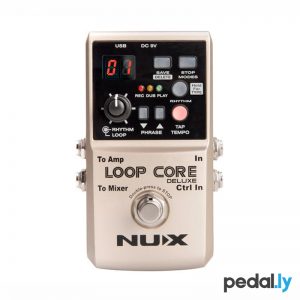Looper Pedals
LOOPER PEDALS
Why you need a looper pedal
A looper pedal is a popular tool used by guitarists for a variety of reasons. Here are some of the main benefits of using a looper pedal:
It’s a practice tool: A looper pedal allows a guitarist to record a section of music or a riff, and then play it back on a loop. This makes it an excellent practice tool for solo practice, allowing the guitarist to focus on playing with precision and timing.
Accompaniment: A guitarist can use a looper pedal to create a backing track that they can play along with. This is particularly useful for solo performances, as it allows the guitarist to create a full sound without needing a band or backing track.
Songwriting: A looper pedal can be a powerful tool for songwriting, allowing a guitarist to record and layer different parts of a song in real-time. This can help the guitarist to experiment with different chord progressions, melodies, and arrangements.
Live performance: A looper pedal can be a valuable tool for live performance, allowing the guitarist to create complex soundscapes and layer different parts of a song to create a full sound. This can be particularly useful for solo performers who want to create a more dynamic and engaging performance.
A looper pedal is a versatile tool that can be used in a variety of ways to enhance a guitarist’s practice, performance, and creativity.
How to choose the best looper pedal
Choosing a looper pedal can be a daunting task as there are many different models and features to consider. Here are some factors to consider when selecting a looper pedal:
Functionality: Different looper pedals offer different functionality, so it’s important to consider what features are important to you. Some models allow you to store and recall multiple loops, while others have the ability to sync to an external clock or tap tempo.
Number of footswitches: The number of footswitches on a looper pedal will affect how easy it is to control the pedal and switch between loops. A single footswitch may be more affordable and compact, but a looper with multiple footswitches will allow for more advanced control.
Recording time: The amount of recording time available on a looper pedal is important to consider. Some pedals may only offer a few seconds of recording time, while others may offer several minutes or even hours.
Sound quality: The sound quality of a looper pedal can vary, so it’s important to consider the quality of the audio and whether it meets your standards. Look for pedals that offer high-quality audio recording and playback.
Price: Looper pedals can range from budget-friendly to high-end models. Consider how much you are willing to spend and what features are most important to you.
The best looper pedal for you will depend on your personal preferences, needs, and budget. Research different models by reading our product descriptions to find the one that meets your needs and feels comfortable to use.

